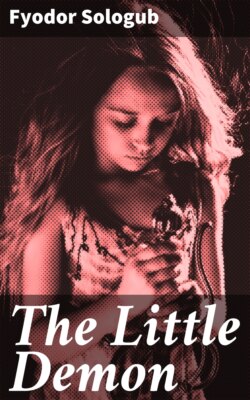Читать книгу The Little Demon - Fyodor Sologub - Страница 7
На сайте Литреса книга снята с продажи.
AUTHOR'S INTRODUCTION
TO THE ENGLISH EDITION
ОглавлениеIt is quite natural for the author of a novel to experience pleasure and pride upon learning that his work is about to become accessible to a new circle of readers. Upon learning, however, that Mr. John Cournos was translating my novel, "The Little Demon," into English I experienced not a little apprehension. In days of Anglo-Russian rapprochement, in days of great stress, when a common danger unites the two great nations, it seemed to me perhaps unseasonable to acquaint England with this sombre picture. It occurred to me that there was a danger of my new readers accepting this novel as a precise and characteristic portrayal of Russian life. But my friends told me that Mr. John Cournos was fulfilling his task with great love and care, and this gives me the hope that the true meaning of my work will be also understood in the translation, reproducing so accurately the original.
In any case, I should like to warn my readers against the temptation of seeing only Russian traits in this novel. The portrait of Peredonov is an expression of the all-human inclination towards evil, of the almost disinterested tendency of a perverse human soul to depart from the common course of universal life directed by one omnipotent Will; and, taking vengeance upon the world for its own grievous loneliness, to bring into the world evil and abomination, to mutilate the given reality and to defile the beautiful dreams of humanity.
This inclination towards evil, raging in the hearts of mankind in all latitudes and longitudes, invests itself only outwardly with an appearance of selfish expedience. A soul marred by this tragic affliction, that of a morose separation from the world, is borne along by a sovereign justice, which rules worlds and hearts, upon disastrous paths, towards madness and towards death.
The afflicted soul does not rejoice at its gains, to such a degree visionary, to such a degree worthless. A foreboding of ultimate destruction torments it with a gnawing sadness.
Where then, in what blessed land, is not man tormented with this agonising sadness, these true tokens of the same morose and sombre affliction? The Russian "khandra" and the English spleen are the expression of one and the same malady of the spirit. Even in more noble souls, these harsh visitors, so familiar to both Englishmen and Russians, have been created by the omnipotent Will not without a beneficent design. They incessantly remind the soul, succumbing in the life struggle, that the enemy is near, cunning and strong.
I would be glad if my new readers should appraise not only the detestable sinfulness and perversity of a soul warped by the force of evil, but also the great yearning of this soul—the evil evil atones to a certain degree in this truly human feeling; and in this feeling the afflicted man also communes with each one of us.
This novel will not be accepted by you in condemnation of my country—my country has not a few enchantments, which make her beloved not only by her own, but also by the observant stranger. Perhaps the attentive reader will find even in this sombre novel certain reflections of enchanting Russian nature, and of the live Russian soul.
FEODOR SOLOGUB
January 1916
